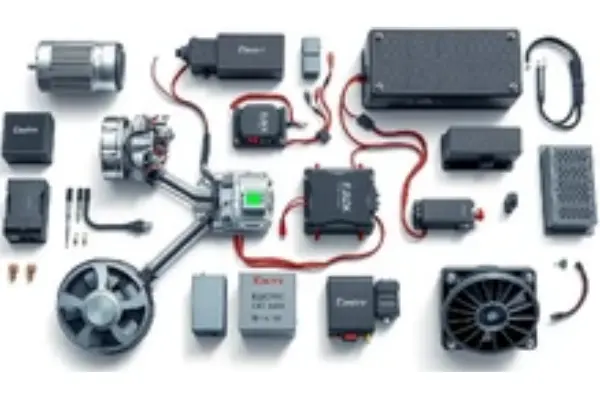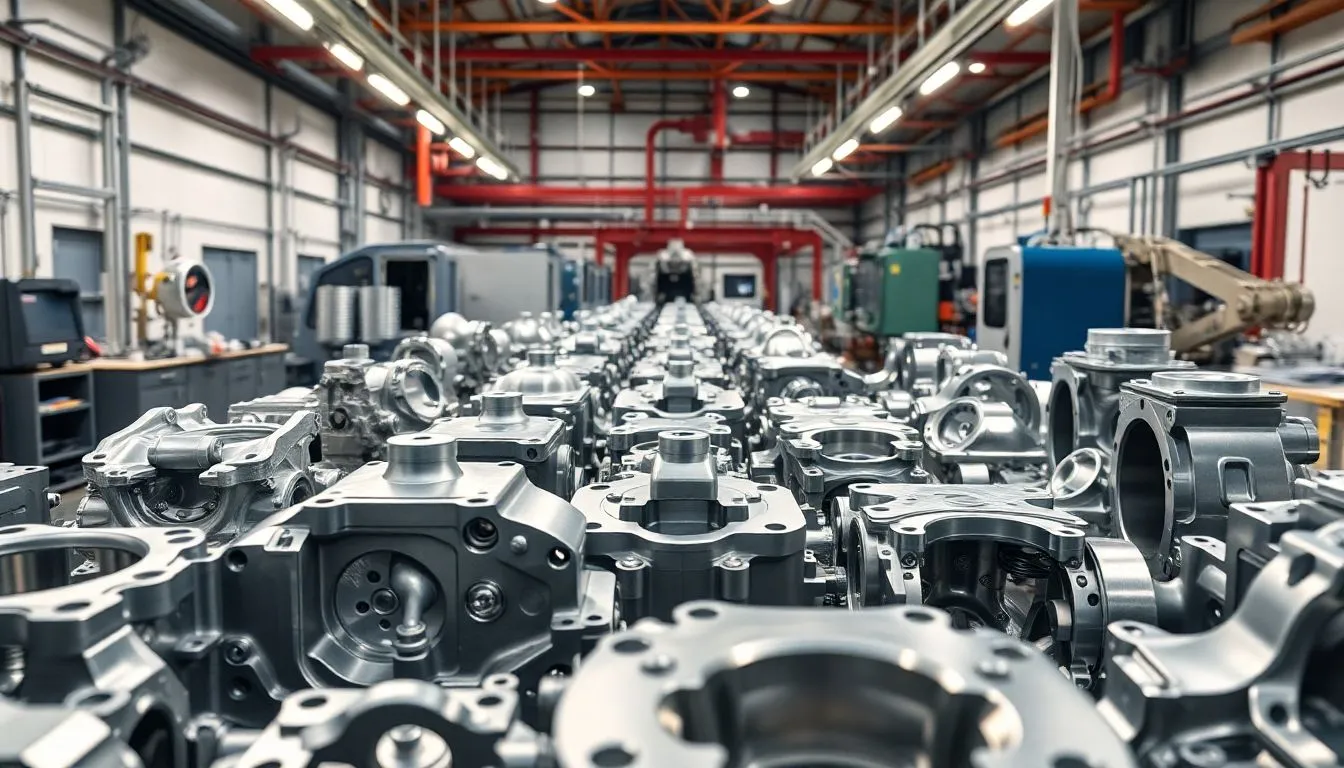

The electric vehicle (EV) industry is growing fast. In 2023, global EV sales hit 14 million, with 18% of cars sold being electric. EVs have electric motors, onboard chargers, battery packs, and more. Companies like empcasting.com and empevmobility.com are big names in EV parts, making things like motor housings and battery units.
empcasting.com leads in EV parts, focusing on die casting. They make many EV parts, like Battery Management Systems and EV Charge Controllers. Their Motor Controllers work with different voltages and powers. Bacancy also makes AC Controllers, like the AC Single Gun Type 2 (7.4KW Controller). They have over a decade of experience and are known for quality EV parts.
empevmobility.com makes OEM Electric Vehicle Units, like DC/DC Converter Units and On-Board Charger Units. They use their engineering skills to create reliable EV parts for the market's needs.
The electric vehicle industry is experiencing rapid growth, with EV sales reaching 14 million in 2023 and 18% of cars sold being electric.
Bacancy is positioned as India's number 1 electric vehicle components manufacturer, offering a diverse range of products.
empcasting.com and empevmobility.com are emerging as significant players in the EV component manufacturing sector.
The EV component market is expected to grow significantly, with a projected market size of $323.5 billion by 2029 and a CAGR of 21.22% from 2024 to 2029.
Key players in the EV component market include Denso Corporation, Robert Bosch GmbH, Continental AG, and other leading automotive suppliers.
The electric vehicle (EV) components market is booming, thanks to more people choosing EVs worldwide. In 2022, the market was worth USD 148.32 Billion. It's expected to hit USD 1001.95 Billion by 2032, growing at 21.05% annually. This rapid growth comes from new tech, green transport pushes, and eco-friendly car demand.
The market includes key parts like batteries, motors, power electronics, and charging systems. Batteries are the biggest part, thanks to BEVs' popularity. Commercial EVs are growing fast, as companies want to cut carbon emissions.
In Asia Pacific, EV sales lead, thanks to government help and local production. Japan leads in hybrid electric vehicles, showing the area's green commitment. But, a big challenge is the lack of charging spots, making EV adoption tough.
To keep up, top EV part makers focus on new ideas and teaming up. They aim to make parts better, cheaper, and more reliable for green travel. As the market changes, EV parts will be key in shaping future travel.
For those looking to tap into the EV parts market, empcasting.com and empevmobility.com have innovative options. They offer everything from die-casting to custom EV units. These leaders help makers meet the demand for top-notch EV parts.
"The electric vehicle components market is poised for exponential growth, driven by the global shift towards sustainable transportation. As the industry continues to evolve, innovative solutions and strategic collaborations will be key to staying ahead of the curve."
The electric vehicle (EV) components market has seen the emergence of several industry leaders. Each plays a vital role in shaping the future of sustainable mobility. Chinese companies like BYD, GAC, and Geley have scaled up their production. They manufacture over 3 million EVs annually. Tesla, a U.S. company, has also made its mark, producing over 1.8 million battery electric vehicles (BEVs) in 2023.
Panasonic, a major Japanese electronics conglomerate, is a leading supplier of EV batteries and other critical components. Bosch, a renowned German automotive technology company, is also at the forefront of innovation in the EV components space. They focus on creating sustainable mobility solutions.
Other notable players include LG Chem, a South Korean battery producer, and Continental AG, a German automotive supplier manufacturing various EV components. The EV component market has also seen the rise of specialized companies. Empcasting.com specializes in die-casting car parts for EVs, including battery housings and charger cases. Empevmobility.com focuses on OEM Electric Vehicle Units such as DC/DC converters and on-board chargers.
As the demand for electric vehicles continues to grow, these leading manufacturers are poised to play a crucial role. They are driving the industry forward and shaping the future of sustainable transportation.
The electric vehicle (EV) components industry is seeing a big change. This change is bringing new levels of efficiency, performance, and making manufacturing better. From new battery tech to smart factories, these changes are changing how EV parts are made.
One big area of change is in battery design. Car makers are working hard to make batteries that hold more energy and charge faster. For example, solid-state batteries are safer and charge quicker. Lithium-sulfur batteries also store more energy than old lithium-ion ones.
There's also a focus on using lighter materials like carbon fiber and aluminum. This makes EVs more efficient and easier to handle. 3D printing, or additive manufacturing, is also being used. It lets us make complex, custom parts quickly and accurately.
Smart factories and automation are also big changes. They use precision machines, robots, and advanced tests to make parts better and faster. These changes help solve big problems like working with special materials and meeting strict safety standards.
As the EV market grows, new tech will be key in making EV parts. Companies like empcasting.com and empevmobility.com are leading the way. They're making sure the latest in manufacturing fits well with EVs.
| Key Innovations in EV Components Production | Impact |
|---|---|
| Advanced Battery Technologies | Increased energy density, faster charging, and improved safety |
| Lightweight Materials | Enhanced efficiency and handling through reduced vehicle weight |
| Additive Manufacturing (3D Printing) | Customized components, increased precision, and faster production |
| Smart Factory Automation | Improved quality, consistency, and throughput in manufacturing |
"The future of electric vehicles lies in the seamless integration of cutting-edge technologies into the manufacturing process. By embracing innovation, we can unlock new levels of efficiency, performance, and sustainability in EV components production."
The world of electric vehicle (EV) parts is growing fast, with different areas leading the way. China, the biggest EV market, is a key player in making parts, with BYD leading the charge. In 2023, China saw 8.1 million new electric cars, a 35% jump from the year before. They also exported over 4 million cars, with 1.2 million being electric.
Europe, known for its car parts makers, is also moving towards EV components, with Bosch and Continental AG leading the pack. In 2023, Europe saw almost 3.2 million new electric cars, a 20% increase. Countries like France and the UK have seen 25% of their car sales be electric. Norway's electric car sales share was almost 95%.
North America, with Tesla at the forefront, is drawing more parts suppliers. The U.S. is set to get $312 billion for EV and battery making, with $223 billion already planned for specific projects. Battery making will get $133 billion of this investment, with foreign companies also investing.
South Korea is big in battery production, with LG Chem and Samsung SDI playing a big role. The Asia Pacific EV industry had a 51.24% market share in 2023.
Japan, home to big car and electronics companies, is also involved in EV parts making. The global EV market was worth USD 500.48 billion in 2023. It's expected to grow to USD 1,891.08 billion by 2032, with a 13.8% CAGR from 2024 to 2032.
As we move towards a greener future, these hubs will be key in the EV world. They will help make electric cars more common and advanced.
| Region | Key Players | Market Share/Growth |
|---|---|---|
| China | BYD | 8.1 million new EV registrations in 2023 (35% increase), 4 million cars exported with 1.2 million EVs |
| Europe | Bosch, Continental AG | 3.2 million new EV registrations in 2023 (20% growth), 25% EV sales share in France and UK, 95% in Norway |
| North America | Tesla | $312 billion investment in U.S. EV and battery manufacturing, $133 billion in battery manufacturing |
| South Korea | LG Chem, Samsung SDI | 51.24% market share in Asia Pacific EV industry |
| Japan | Automotive and electronics companies | Global EV market size projected to reach $1.89 trillion by 2032 (13.8% CAGR) |
As we move towards a greener future, these hubs will be key in the EV world. They will help make electric cars more common and advanced.
"The shift to electric vehicles is a global phenomenon, and these regional manufacturing centers are at the forefront of this transformation. Their continued investments and technological innovations will be key to accelerating the widespread adoption of EVs worldwide."
The electric vehicle component manufacturing industry is growing fast. This growth is because more people are choosing EVs worldwide. Companies like empcasting.com and empevmobility.com are ready to meet this demand. They offer special parts and systems for the changing needs of the industry.
The future of EVs will see big improvements in battery tech, motor efficiency, and smart power systems. These advancements will make EVs more sustainable and efficient. EV startups will use digital twins and the APQP framework to ensure quality and stay competitive.
The industry's focus on sustainability and green practices will grow. This means using recycled materials, energy-saving processes, and new tech like V2G integration. By tackling infrastructure, supply chain, and emissions issues, the EV component industry will be key to sustainable mobility's future.


